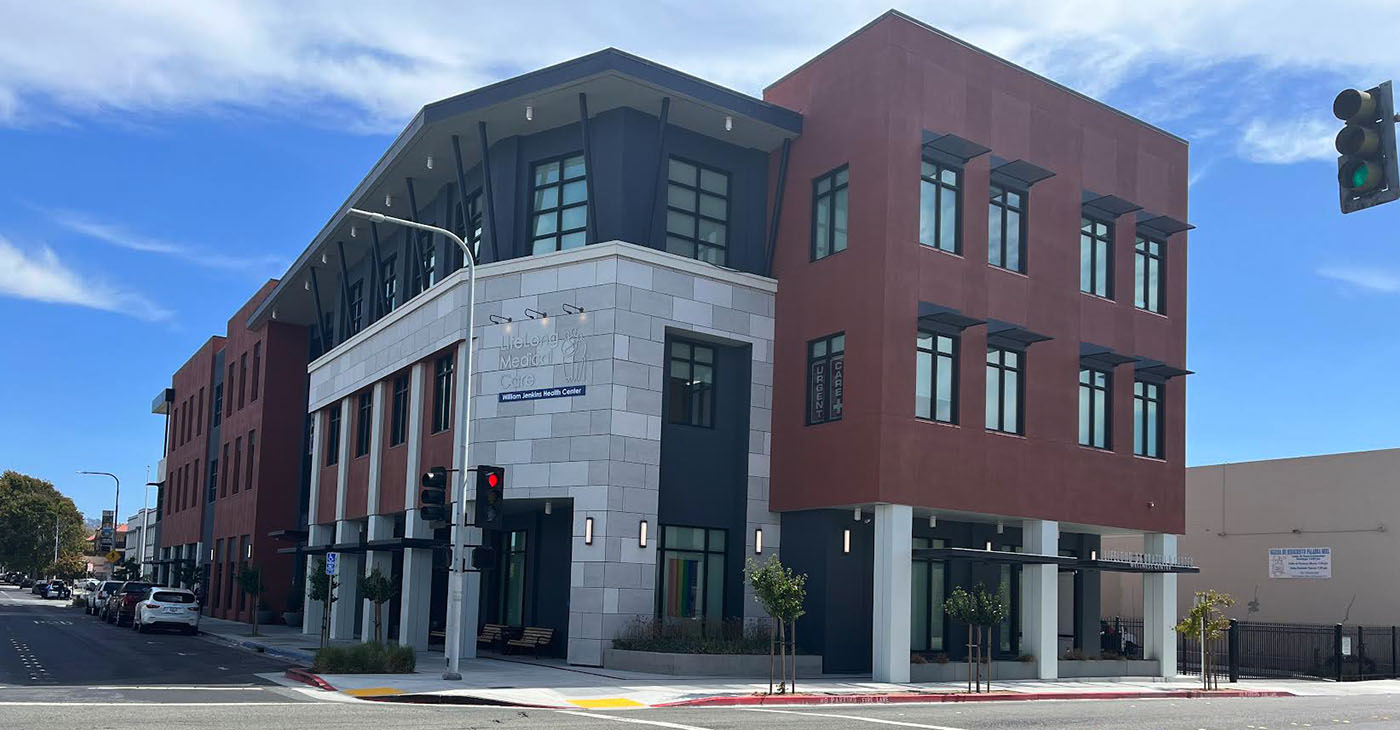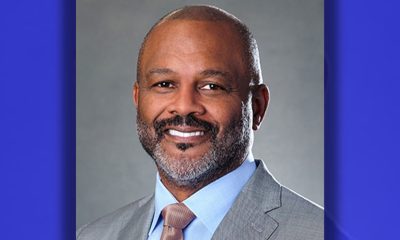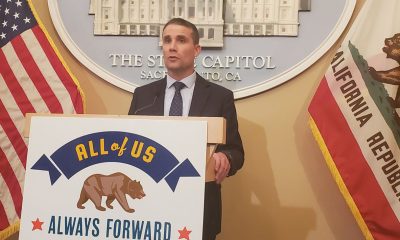Activism
New Lifelong Medical Center Holds Dedication Ceremonies in Richmond
In a pre-dedication ceremony, Dr. Brazell H. Carter, president of the Robinson Weeks Robinson (RWR) scholarship program and a physician at LifeLong, officially welcomed early attendees in the RWR Conference Room, announcing that the WJHC has been in full operation since the facility opened in February 2020. The dedication was postponed in March 2020 because of the pandemic

By Clifford L. Williams
A cascade of blue and white balloons, amazing colorful artwork, and nearly 300 excited patrons, were all part of the grand dedication last week for the LifeLong William Jenkins Health Center (WJHC), located at 150 Harbour Way in Richmond, CA.
In a pre-dedication ceremony, Dr. Brazell H. Carter, president of the Robinson Weeks Robinson (RWR) scholarship program and a physician at LifeLong, officially welcomed early attendees in the RWR Conference Room, announcing that the WJHC has been in full operation since the facility opened in February 2020. The dedication was postponed in March 2020 because of the pandemic
Dr. Nathan Stern, Associate Medical Director of the LifeLong William Jenkins Health Center, discussed some of the services available at the huge, 33,000 sq. ft., three-story complex. “We are the only LifeLong facility in Richmond, with services for newborns to older adults.”
“We have the only urgent care services in Richmond which are currently open five days a week, in addition to a behavioral health department that includes mental health therapy for adults. Since its opening, the center has served over 80,000 patients.”
“We also have a very active prenatal program. Many pregnancies have come through the facility. We have an 18-resident Family Medicine residency program which started over two years ago, with our first class scheduled to graduate next summer. The faculty will bring with them a lot of specialty services including podiatry, acupuncture, procedure clinics, women’s health procedures, and radiology.”
“In addition, we have a large dental clinic that includes services from extractions to implants, as well as COVID-19 labs where staff can provide COVID testing and vaccinations. The LifeLong faculty also has a wellness center which focuses on healthy eating, and exercise classes which have been conducted via hybrid classes and Zoom because of the pandemic.”
The WJHC accepts MediCal and Medicare patients, as well as people who do not have any insurance at all. “As a federally-qualified health center, we do not deny medical services to anyone, even if they don’t have the ability to pay,” said Dr. Stern.
“Our main population of patients, nearly 70%, have MediCal, and since May of this year, that number has increased significantly. Other patients, about 15%, are uninsured. Some patients may pay on a sliding scale from $45 to $115, based on their income.”
As one of the leading Scholarship Funds in West Contra Costa County, the RWR scholarship has been at the forefront of making a difference in the community since 1989. The program supports students with ambitions in medicine and S.T.E.M. programs, looking to create a lasting change. Dr. Carter, who oversees its operation, has been providing medical services for over 40 years.
Dr. Carter is a Bay Area community leader in health medicine. He practiced at his facility on McDonald Avenue in Richmond for the last 40 years until he joined LifeLong as a practicing physician. He also is a director of four nursing facilities in the area.
Dr. Stern noted that there’s a big difference in how well the County takes care of undocumented residents. “There are fewer services out here for those patients,” said Stern. “When it comes to the health care the County provides, it’s on a different level.
“I’m amazed what a great health center this is in Contra Costa County. Having this health center with all these outstanding services and community resources is why I came to work here. The only other medical facility is the nearby Kaiser Hospital.”
LifeLong has another large clinic in San Pablo, however, the facility does not have a residency program. LifeLong also operates a smaller site in Pinole, as well as a satellite site in Rodeo.
For more information on how to obtain care at LifeLong Medical Care or to make a donation, call 510.981.4100 or visit www.lifelongmedical.org. For more information on the Robinson Weeks Robinson scholarship program and to make scholarship donations, contact them at 510.426.6044 or RobinsonWeeksRobinsonScholarships.org.
Activism
Oakland Post: Week of April 24 – 30, 2024
The printed Weekly Edition of the Oakland Post: Week of April 24 – 30, 2024

To enlarge your view of this issue, use the slider, magnifying glass icon or full page icon in the lower right corner of the browser window. ![]()
Activism
Oakland Post: Week of April 17 – 23, 2024
The printed Weekly Edition of the Oakland Post: Week of April 17 – 23, 2024

To enlarge your view of this issue, use the slider, magnifying glass icon or full page icon in the lower right corner of the browser window. ![]()
Activism
Oakland Schools Honor Fred Korematsu Day of Civil Liberties
Every Jan. 30, OUSD commemorates the legacy of Fred Korematsu, an Oakland native, a Castlemont High School graduate, and a national symbol of resistance, resilience, and justice. His defiant stand against racial injustice and his unwavering commitment to civil rights continue to inspire the local community and the nation. Tuesday was “Fred Korematsu Day of Civil Liberties and the Constitution” in the state of California and a growing number of states across the country.

By Post Staff
Every Jan. 30, OUSD commemorates the legacy of Fred Korematsu, an Oakland native, a Castlemont High School graduate, and a national symbol of resistance, resilience, and justice.
His defiant stand against racial injustice and his unwavering commitment to civil rights continue to inspire the local community and the nation. Tuesday was “Fred Korematsu Day of Civil Liberties and the Constitution” in the state of California and a growing number of states across the country.
One OUSD school is named in his honor: Fred T. Korematsu Discovery Academy (KDA) elementary in East Oakland.
Several years ago, founding KDA Principal Charles Wilson, in a video interview with anti-hate organization “Not In Our Town,” said, “We chose the name Fred Korematsu because we really felt like the attributes that he showed in his work are things that the children need to learn … that common people can stand up and make differences in a large number of people’s lives.”
Fred Korematsu was born in Oakland on Jan. 30, 1919. His parents ran a floral nursery business, and his upbringing in Oakland shaped his worldview. His belief in the importance of standing up for your rights and the rights of others, regardless of race or background, was the foundation for his activism against racial prejudice and for the rights of Japanese Americans during World War II.
At the start of the war, Korematsu was turned away from enlisting in the National Guard and the Coast Guard because of his race. He trained as a welder, working at the docks in Oakland, but was fired after the bombing of Pearl Harbor in 1941. Fear and prejudice led to federal Executive Order 9066, which forced more than 120,000 Japanese Americans out of their homes and neighborhoods and into remote internment camps.
The 23-year-old Korematsu resisted the order. He underwent cosmetic surgery and assumed a false identity, choosing freedom over unjust imprisonment. His later arrest and conviction sparked a legal battle that would challenge the foundation of civil liberties in America.
Korematsu’s fight culminated in the Supreme Court’s initial ruling against him in 1944. He spent years in a Utah internment camp with his family, followed by time living in Salt Lake City where he was dogged by racism.
In 1976, President Gerald Ford overturned Executive Order 9066. Seven years later, the 9th Circuit Court of Appeals in San Francisco vacated Korematsu’s conviction. He said in court, “I would like to see the government admit that they were wrong and do something about it so this will never happen again to any American citizen of any race, creed, or color.”
Korematsu’s dedication and determination established him as a national icon of civil rights and social justice. He advocated for justice with Rosa Parks. In 1998, President Bill Clinton gave him the Presidential Medal of Freedom saying, “In the long history of our country’s constant search for justice, some names of ordinary citizens stand for millions of souls … To that distinguished list, today we add the name of Fred Korematsu.”
After Sept. 11, 2001, Korematsu spoke out against hatred and discrimination, saying what happened to Japanese Americans should not happen to people of Middle Eastern descent.
Korematsu’s roots in Oakland and his education in OUSD are a source of great pride for the city, according to the school district. His most famous quote, which is on the Korematsu elementary school mural, is as relevant now as ever, “If you have the feeling that something is wrong, don’t be afraid to speak up.”
-

 Activism4 weeks ago
Activism4 weeks agoOakland Post: Week of March 27 – April 2, 2024
-

 #NNPA BlackPress4 weeks ago
#NNPA BlackPress4 weeks agoCOMMENTARY: D.C. Crime Bill Fails to Address Root Causes of Violence and Incarceration
-

 #NNPA BlackPress4 weeks ago
#NNPA BlackPress4 weeks agoMayor, City Council President React to May 31 Closing of Birmingham-Southern College
-

 #NNPA BlackPress4 weeks ago
#NNPA BlackPress4 weeks agoBeloved Actor and Activist Louis Cameron Gossett Jr. Dies at 87
-

 Community1 week ago
Community1 week agoFinancial Assistance Bill for Descendants of Enslaved Persons to Help Them Purchase, Own, or Maintain a Home
-

 Activism3 weeks ago
Activism3 weeks agoOakland Post: Week of April 3 – 6, 2024
-

 Business1 week ago
Business1 week agoV.P. Kamala Harris: Americans With Criminal Records Will Soon Be Eligible for SBA Loans
-

 Activism2 weeks ago
Activism2 weeks agoOakland Post: Week of April 10 – 16, 2024























































